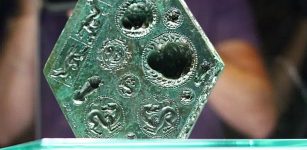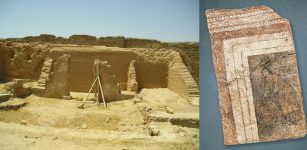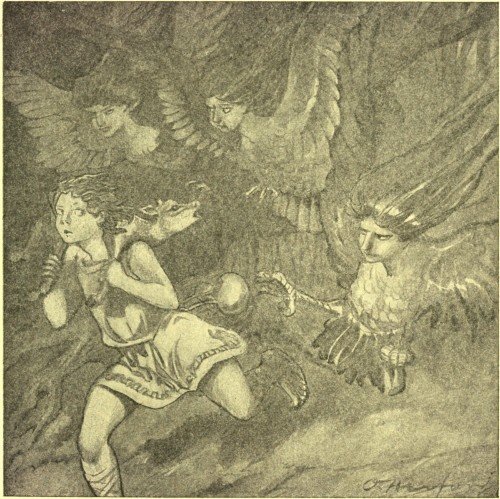Prophet King Phineus Revealed The Future To Humans And Unleashed God Zeus’ Fury
Ellen Lloyd - AncientPages.com - Going against the gods' wishes can be dangerous, and King Phineus certainly made the Greek deities furious.
Having received the gift of prophecy, King Phineus used it to reveal the gods' plans and the future to humans. His behavior unleashed god Zeus' fury, and King Phineus was punished by becoming a blind and tortured man, but after some time, a hero came to his rescue.
Who Was King Phineus?
In Greek mythology, King Phineus is an exciting character we learn more about in the tale of Jason and the Argonauts.
To the left and right, the winged Boreads rescue Phineas from the Harpies. Credit: Leningrad Painter, Public Domain
King Phineus ruled over the northeastern region of Greece known as Thrace. It's uncertain who his parents were. Ancient sources provide conflicting information about his parentage and three different fathers are commonly named. Apollonius of Rhodes, who wrote the epic poem Argonautica, about Jason and the Argonauts and their quest for the Golden Fleece, said Phineus was a son of Agenor, a Phoenician king of Tyre who lived around 2,000 B.C.
Other ancient authors state he was a child conceived by Poseidon, who was the god of the sea, storms, earthquakes, and horses. A third possibility is that Phineus was the son of Phoenix and Cassiopeia.
King Phineus married twice and had several children, both daughters and sons.
King Phineus Received The Gift of Prophecy And Misused It
How King Phineus acquired the gift of prophecy is debated and unclear.
In the tale of Phineus, it was god Apollo who taught the Thracian king the art of prophecy. Other sources inform that God Zeus made King Phineus a powerful seer.
King Phineus' had remarkable foresight, but he misused his powers by disclosing gods' plans and the future to humans.
Revealing divine truths to mortal men was strictly prohibited, and a furious Zeus decided he must punish the Thracian king.
The Punishment And Rescue Of King Phineus
Zeus left Phineus on an island, and the Thracian king was punished by becoming a blind man.
King Phineus was not the only Greek seer who had been punished by blindness. The unusual prophet Tiresias who turned into a woman for seven years, suffered a similar fate when his eyesight was taken away from him.
To make King Phineus' punishment even more severe, Zeus sent the Harpies to torture the seer.
In Greek mythology, the Harpies appear as monstrous winged women known as people snatchers. The Harpies stole whatever food King Phineus had.
The torture of King Phineus continued until the arrival of Jason and the Argonauts upon the shores of Thrace.
When King Phineus "came out to meet them with a lean and woful face, and said, "Welcome, gallant heroes, to the land of bitter blasts, the land of cold and misery; yet I will feast you as best I can." And he led them in, and set meat before them; but before they could put their hands to their mouths, down came two fearful monsters, the like of whom man never saw; for they had the faces and the hair of fair maidens, but the wings and claws of hawks; and they snatched the meat from off the table and flew shrieking out above the roofs.
Drawing of the Harpies by Oliver Herford (1863-1935) Credit: Public Domain
Then Phineus beat his breast and cried: "These are the Harpies, whose names are the Whirlwind and the Swift, the daughters of Wonder and of the Amber-nymph, and they rob us night and day.
They carried off the daughters of Pandareus, whom all the Gods had blest; for Aphrodite fed them on Olympus with honey and milk and wine; and Hera gave them beauty and wisdom, and Athené skill in all the arts; but when they came to their wedding, the Harpies snatched them both away, and gave them to be slaves to the Erinnues, and live in horror all their days.
And now they haunt me, and my people, and the Bosphorus, with fearful storms; and sweep away our food from off our tables, so that we starve in spite of all our wealth." 1
King Phineus begged Jason and his men to rescue him from his eternal torture. They were reluctant at first because easing his pain would be an act against the will of the gods. However, Phineus ensured the crew of the ship Argo that they would not be punished for helping him.
Jason and the Argonauts arriving at Colchis, by Charles de La Fosse. This painting is located in the Château de Versailles, CC BY-SA 3.0
King Phineus told Jason that "he would be the first Greek to sail through the Clashing Rocks which guards the way to Colchis. historically speaking, this part of the myth is an explanation of how the Greeks were first able to sail upstream through the strong currents of the Bosphorus to enter the Black Sea. the Black Sea was no longer called the hostile sea after this, from now on, it would be known as the welcoming sea." 2
Jason and the Argonauts agreed to deliver Phineus from his torment. The Thracian king provided the Argo crew with instructions on navigating between the Symplegades and dealing with the fearsome and shape-shifting Stymphalian birds.
Written by Ellen Lloyd – AncientPages.com
Updated on August 31, 2022
Copyright © AncientPages.com All rights reserved. This material may not be published, broadcast, rewritten or redistributed in whole or part without the express written permission of AncientPages.com
Expand for referencesMore From Ancient Pages
-
 Unique 2,000-Year-Old Hexagonal-Shaped Bronze Matrix Of Sarmizegetusa Regia, Romania
Artifacts | Jan 7, 2016
Unique 2,000-Year-Old Hexagonal-Shaped Bronze Matrix Of Sarmizegetusa Regia, Romania
Artifacts | Jan 7, 2016 -
 Remarkable Ancient Animal Engravings Discovered In Unknown Cave In Sinai
Archaeology | May 1, 2020
Remarkable Ancient Animal Engravings Discovered In Unknown Cave In Sinai
Archaeology | May 1, 2020 -
 Mysterious Time Slips Near An Ancient Church – Reported
Featured Stories | Oct 23, 2018
Mysterious Time Slips Near An Ancient Church – Reported
Featured Stories | Oct 23, 2018 -
 Historians Search For A Frightening Ancient Underground Secret In One Of Tampa Bay’s Cities
Featured Stories | Sep 1, 2024
Historians Search For A Frightening Ancient Underground Secret In One Of Tampa Bay’s Cities
Featured Stories | Sep 1, 2024 -
 Jigai – Suicide Ritual For Wives Of Samurai – Feminine Counterpart Of Seppuku
Ancient History Facts | Feb 24, 2018
Jigai – Suicide Ritual For Wives Of Samurai – Feminine Counterpart Of Seppuku
Ancient History Facts | Feb 24, 2018 -
 More Than 1, 300 Prehistoric Burial Mounds In Western Azerbaijan Have Been Systematically Surveyed For The First Time
Archaeology | Dec 19, 2024
More Than 1, 300 Prehistoric Burial Mounds In Western Azerbaijan Have Been Systematically Surveyed For The First Time
Archaeology | Dec 19, 2024 -
 Yomi – Kingdom Of The Dead In Japan’s Native Shinto Religion
Featured Stories | Jun 7, 2021
Yomi – Kingdom Of The Dead In Japan’s Native Shinto Religion
Featured Stories | Jun 7, 2021 -
 South American Cultures Quickly Adopted Horses – New Study
Archaeology | Dec 26, 2023
South American Cultures Quickly Adopted Horses – New Study
Archaeology | Dec 26, 2023 -
 Longest European Burial Mound Pre-Dating The Egyptian Pyramids Discovered In Czechia
Archaeology | Jun 24, 2024
Longest European Burial Mound Pre-Dating The Egyptian Pyramids Discovered In Czechia
Archaeology | Jun 24, 2024 -
 Hidden Tunnel In Tokat Castle – ‘The Dungeon Of Dracula’ – To Open Soon
News | Sep 22, 2015
Hidden Tunnel In Tokat Castle – ‘The Dungeon Of Dracula’ – To Open Soon
News | Sep 22, 2015 -
 Has World’s Oldest Image Of Virgin Mary Been Discovered In Dura-Europos Church?
Archaeology | Mar 17, 2017
Has World’s Oldest Image Of Virgin Mary Been Discovered In Dura-Europos Church?
Archaeology | Mar 17, 2017 -
 Future Of Thornborough Henges Secured – Stonehenge Of The North Preserved For The Nation
News | Feb 3, 2023
Future Of Thornborough Henges Secured – Stonehenge Of The North Preserved For The Nation
News | Feb 3, 2023 -
 Biblical Mystery Of Urim And Thummim: God’s Puzzling Communication Devices
Ancient Mysteries | Jun 18, 2017
Biblical Mystery Of Urim And Thummim: God’s Puzzling Communication Devices
Ancient Mysteries | Jun 18, 2017 -
 Engraved Trees Are Living Records Capturing The Rich History And Traditions Of The Sámi People
Archaeology | Nov 21, 2024
Engraved Trees Are Living Records Capturing The Rich History And Traditions Of The Sámi People
Archaeology | Nov 21, 2024 -
 Sacred Ancient Texts Reveal Who Really Aligned The Oldest Monuments To The Stars
Ancient Mysteries | May 26, 2018
Sacred Ancient Texts Reveal Who Really Aligned The Oldest Monuments To The Stars
Ancient Mysteries | May 26, 2018 -
 The Iceni’s Queen Boudicca Who Revolted Against Roman Rule
Featured Stories | Apr 3, 2023
The Iceni’s Queen Boudicca Who Revolted Against Roman Rule
Featured Stories | Apr 3, 2023 -
 Image Of The Day: The Inghirami Tomb At Volterra, Italy
Image Of The Day | Sep 9, 2015
Image Of The Day: The Inghirami Tomb At Volterra, Italy
Image Of The Day | Sep 9, 2015 -
 Irish God Ogma – Outstanding Warrior And Inventor Of The Ogham Script
Myths & Legends | Jul 3, 2024
Irish God Ogma – Outstanding Warrior And Inventor Of The Ogham Script
Myths & Legends | Jul 3, 2024 -
 One Of Europe’s Most Ancient Domestic Dogs Lived In The Basque Country 17,000 Years Ago
Archaeology | Nov 29, 2022
One Of Europe’s Most Ancient Domestic Dogs Lived In The Basque Country 17,000 Years Ago
Archaeology | Nov 29, 2022 -
 Patara: One Of The Six Big Cities Of Lycian League Is Celebrated In 2020
Archaeology | Jan 15, 2020
Patara: One Of The Six Big Cities Of Lycian League Is Celebrated In 2020
Archaeology | Jan 15, 2020




